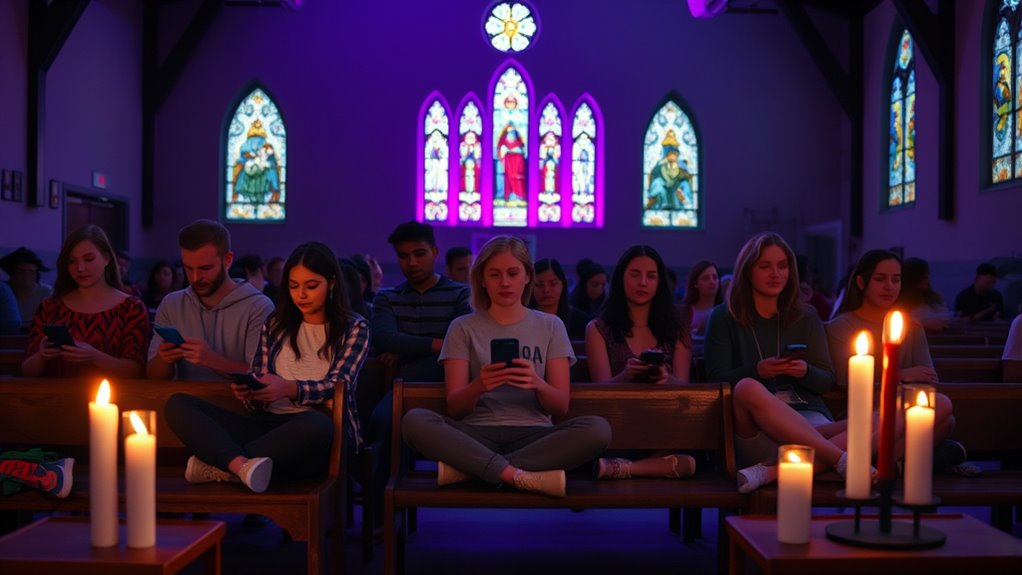To foster revival among Gen Z in 2025, you’ll need to embrace digital platforms and create authentic, relatable content. This generation prefers personalized spiritual journeys through social media, podcasts, and online communities that address real-life struggles. Active engagement and honest dialogue can build lasting connections. If you continue exploring, you’ll discover strategies to motivate renewal and retreat that truly resonate with their desire for genuine faith experiences.
Key Takeaways
- Digital platforms will be central for church revival efforts, engaging Gen Z through authentic, interactive content.
- Personalization and diverse spiritual voices may lead to continued faith fragmentation among Gen Z.
- Churches that adapt to online engagement and foster genuine community can facilitate spiritual renewal.
- Technology like immersive projectors and social media will enhance faith experiences and outreach.
- Addressing fragmentation with clear, meaningful guidance is crucial for fostering revival and spiritual depth in 2025.

Have you ever wondered why many in Generation Z seem disengaged from traditional church settings? It’s not that they lack faith or spirituality; rather, they’re maneuvering a world where digital engagement dominates daily life. For Gen Z, faith isn’t confined to Sunday services or church buildings. Instead, they turn to social media, podcasts, and online communities to explore spiritual questions and find connection. This shift has created a landscape where faith fragmentation is common—where their beliefs are often a patchwork influenced by various sources rather than a unified doctrine. They may follow multiple spiritual voices, pick and choose what resonates, and discard what doesn’t, all within a digital environment that encourages customization.
This fragmentation isn’t necessarily a sign of disinterest; it’s a reflection of their desire for authenticity and personalized faith experiences. They value conversations they can participate in, not just listen to passively. Churches that only broadcast sermons from the pulpit may miss the mark because Gen Z seeks engagement that feels genuine and relatable. They want content that speaks to their real-world struggles and hopes, delivered in formats they’re comfortable with—short videos, interactive apps, or live chats. If traditional institutions don’t adapt their approach to digital engagement, they risk further alienating these young people, who already see many churches as outdated or disconnected from their realities.
What’s more, digital engagement offers a double-edged sword. On one hand, it provides opportunities for deeper connection and spiritual growth through online groups and resources. On the other hand, it fosters faith fragmentation, where beliefs can become fragmented or diluted as information from various sources competes for attention. This can lead to confusion or superficial understanding of complex theological ideas. Yet, it also presents a chance for churches to meet Gen Z where they are—online and in real-time. If they craft engaging, relevant content that encourages conversation, they can guide this digital engagement into meaningful spiritual experiences.
Additionally, understanding the importance of projector technology can help churches create immersive environments that resonate with digital natives, making faith experiences more compelling and accessible. To bridge the gap, churches need to rethink their strategies. Embracing digital platforms, fostering community online, and encouraging honest dialogue can help counteract faith fragmentation. They must become more than a physical building; they should be an active digital presence that invites participation. When you understand how digital engagement shapes their faith landscape, you see the potential for revival—an opportunity to re-engage a generation that’s eager for authentic connection but needs it delivered in ways they trust and understand.
Frequently Asked Questions
How Are Churches Adapting to Digital Engagement With Gen Z?
You see churches actively embracing digital engagement by focusing on virtual outreach and digital discipleship. They create engaging online content, host live-streamed services, and develop apps to connect with Gen Z where they spend their time. By offering meaningful virtual communities and interactive faith resources, churches foster spiritual growth and maintain relevance, ensuring that younger generations feel connected and supported in their faith journey through accessible digital platforms.
What Specific Spiritual Needs Does Gen Z Seek From the Church?
You seek authentic connection and personal growth from the church, like finding a compass in a fog. Gen Z craves genuine relationships where they can explore their spirituality openly, ask questions, and grow without judgment. They want a community that supports their journey, fosters honesty, and helps them discover purpose. By meeting these needs, the church becomes a meaningful space for their spiritual development and self-discovery.
How Does Social Justice Influence Gen Z’s Church Participation?
You see that social justice deeply influences your church participation through social activism and faith activism. When your church actively advocates for issues like racial equality and environmental justice, you’re more likely to engage, feeling your faith aligns with making a tangible difference. Conversely, if the church ignores social justice, you might distance yourself, seeking communities that embody your commitment to faith-driven social activism and justice.
Are There Generational Conflicts Within Church Communities Regarding Gen Z?
You’ll notice intergenerational tensions often arise within church communities, especially around tradition versus innovation. About 60% of Gen Z members feel their perspectives aren’t fully valued, highlighting clashes with older generations. These conflicts reflect differing views on adapting faith practices. While some see change as necessary, others cling to tradition. Managing these tensions requires open dialogue, understanding, and a willingness to blend innovation with cherished traditions.
What Role Does Mental Health Awareness Play in Gen Z’s Faith Journey?
Mental health awareness plays a vital role in your faith journey, as mental health advocacy helps you feel more understood and supported within the church community. When faith and wellness are integrated, you’re more likely to find healing and comfort during tough times. You can openly discuss mental health struggles without fear of judgment, strengthening your spiritual growth and fostering a compassionate environment that encourages holistic well-being.
Conclusion
As you navigate this spiritual landscape, think of Gen Z as a restless river, carving new paths through the rocky terrain of tradition. Sometimes it flows fiercely, sometimes quietly, but always with purpose. The church is like a sturdy bridge—both resisting and supporting the current. Together, your journey can shape a mighty stream of revival or retreat, depending on how you embrace change and stay rooted. The choice is yours—what will your tributary become?










